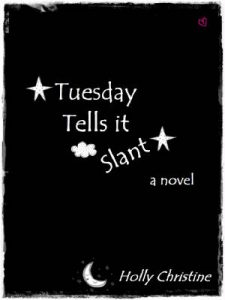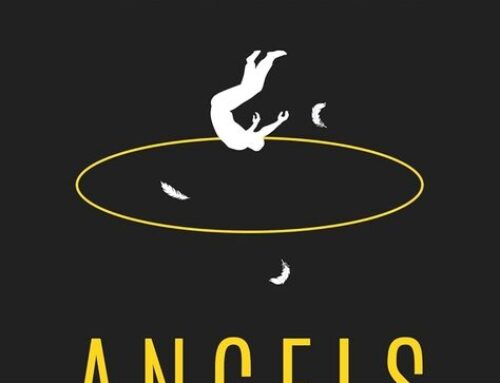 The structure of this novel might make a writer sit up and say, “Why didn’t I think of this?” The book follows Tuesday Morning (her real name) throughout her life in a series of diary entries and real life events. The book will switch from 2009 to 1990 to 1998 and back again. It’s a great way to illustrate the timelessness of life – how old events are with us, almost as if they’re always happening in real time. Tuesday decides to reimagine her diary as a way of reimagining her life – as if she can rewrite her real life by rewriting what’s been chronicled in her diary.
The structure of this novel might make a writer sit up and say, “Why didn’t I think of this?” The book follows Tuesday Morning (her real name) throughout her life in a series of diary entries and real life events. The book will switch from 2009 to 1990 to 1998 and back again. It’s a great way to illustrate the timelessness of life – how old events are with us, almost as if they’re always happening in real time. Tuesday decides to reimagine her diary as a way of reimagining her life – as if she can rewrite her real life by rewriting what’s been chronicled in her diary.
This can be a hard structure to pull off. One of the challenges is keeping the narrative voices different enough so it’s still recognizably the same person, but still exhibits a similarity, conveying the message that the core of who we are doesn’t really change as we go through life. Each chapter starts with a diary entry with the real-life events following. The trouble here is that if you’re writing about someone in their late twenties, it cannot have the exact same narrative voice as the young teenager, or else it makes the character seem overly homogenized, as if the person has not grown at all. In one sense, this is precisely the point – to show how significant parts of us remain constant. But that’s a different issue than language, which should hopefully improve with age, especially for a literate devotee of Emily Dickinson, who is featured throughout the book.
What’s also challenging about the structure is that a reader may become connected to a certain age of the character. The older character working at a lit magazine called The End felt much more alive, and this is not just a case where flashback tends to feel slightly removed and less immediate. I found myself reading faster through the other sequences to get to the section that I was enjoying more. I could imagine someone having the exact opposite experience and wanting to stay with the young adult character – which could very well broaden the novel’s reach.
Understandably, I’m more interested in the older character who pontificates about things like self-publishing than I am in the problems of a teenage girl. But this isn’t just an age or gender issue, it’s that the present-day sections about Tuesday are more fully-realized, and takes more chances. Here, she gets into an online argument with pompous writer Jeremy Wallace:
The Jeremy Wallace said…
How can you possibly believe that this “new form” of publishing will change the industry? All that these vanity presses do is flood the market with garbage books. Everyone who self-publishes was rejected by an agent or publishing house for a reason. Generally, that reason is that the work presented wasn’t of the caliber that the publishing industry demands. I’m stunned that a magazine that many look to for new Literary works would side with what can only be labeled a vanity
press. Masked Press is deceiving itself and will undoubtedly curse the day it diluted its name and reputation with a self-publishing press.
…On February 16, 2009 10:17 PM EST“The Tuesday Morning” said…
I’m going to just pretend that the work you “create” can be called Literature, Mr. Jeremy Wallace. Five years ago, you published “Demon Kiss of Light” through Masked Press. Two months later, you produced “Demons of the Dark.” Two months after that, you published “Demons Rise.” Just to refresh readers on your work, I’ll include of full list of your titles:
Demon Marks the Spot
Demon Kill
Demons of the Dungeons
The Masked Demon
Demon Out of Hell
Demonic Jungle
Helluva Demon
The Drink of Demons
Demon vs Demon
Demon Birth
Demon Death
Flesh: Demon Mountain
Demonic Hearts
And so the list goes on. Can you really say that the work you create is Literary? Granted, I can’t argue that you aren’t selling books, but are you creating anything
new? No. What you have done is flood the market with demons. You created a cookie cutter for yourself and all that you do is throw in a few new characters, a few
gruesome scenes and call it a day. The Jeremy Wallace is a hack. Get over yourself and quit writing shit garbage.…On February 16, 2009 at 11:12PM EST
Edited by Eli Dear on February 17, 2009 12:15AM ESTThe Jeremy Wallace said…
Would you like to know the difference between you and me, Tuesday Morning? It’s creative passion. You have a love of language, sure. But me… I have the creative passion to create something with that language that you love so dearly. You are an editor and a reviewer because you can’t do what I have done. You have settled for second best. I hope that sometime in the near future you get laid, because you surely are a fickle bitch.
…On February 16, 2009 at 11:15PM EST
“The Tuesday Morning” said…
I’m really glad that you brought up sex, Mr. Everything, because you surely put out, fucking screwing the nation with your so-called “creative language.” You are the reason why real Literary Fiction is overlooked. You are the equivalent of trashy reality TV in the publishing industry. The reason that traditional presses are removing the greed wool from their eyes is because Print On Demand sales of Literary Fiction have proven successful. These new self-published authors don’t have to shell out a ton of cash. They just make their work available with a simple click of the mouse. Many authors who self-published last year were actually picked up by traditional presses after selling thousands of copies of their work in a matter of months. What does this say about readers? It says that readers want more than a TV dinner.
…On February 16, 2009 at 11:19PM EST
Edited by Eli Dear on February 17, 2009 at 12:35AM ESTThe Jeremy Wallace said…
I hope to never meet you on the street, Miss Morning.…On February 16, 2009 at 11:27PM EST
“The Tuesday Morning” said…
Likewise, dickwad Jerk face.
The debate about self-publishing aside (which I’m posting because I like it), it is an example of how this Tuesday story is far more lively than the other sections of the book. This is not necessarily a narrative device to show that she has more pent up rage than she did as a teenager – it’s, I suspect, because this character is also closer to the author and so the result is that the narrative is more spirited. The result is that the thread between the present and past does not entirely gel.
This is the first novel I’ve reviewed here where I’ve also reviewed another novel – The Nine Lives of Clemenza – also by the same writer. That book had similar problems to this one – in that novel, the nine lives are more episodic than woven together, and Tuesday Tells it Slant has a similar issue. There’s not enough connecting the stories together, which sometimes gives it the impression of several different novels running concurrently, rather than a single whole.
The lively scenes are lively (in both novels), but TTiS seems more like an extended short story than a fully-realized longer work. While the concept of rewriting your past is an interesting one – if the past story is less riveting, this causes the plot device to be less riveting as well. It’s an ambitious novel, much like Nine Lives of Clemenza is ambitious, but it doesn’t quite live up to what’s it’s trying to accomplish. Still, one has to respect the ambition and the uniqueness of the storyline, which does make up for some of the novel’s other faults.
An interview on the Indie Spotlight.
Get an Editorial Review | Get Amazon Sales & Reviews | Get Edited | Publish Your Book | Enter the SPR Book Awards | Other Marketing Services






















Leave A Comment